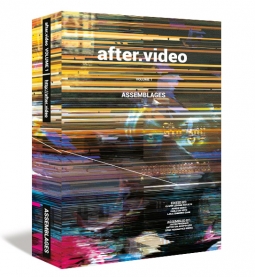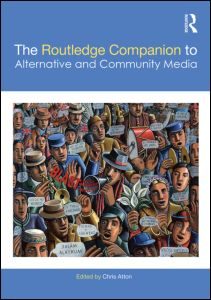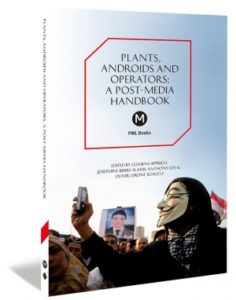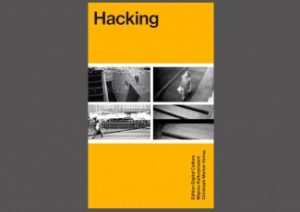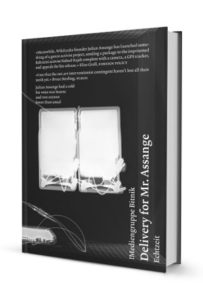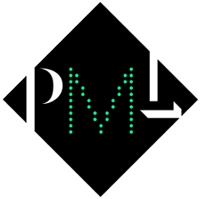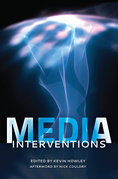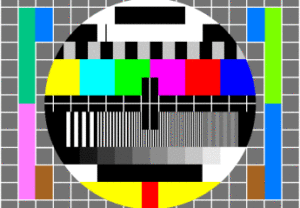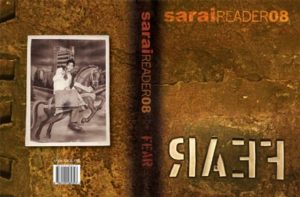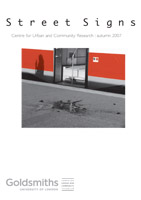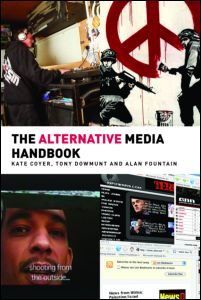Please refer to ORCID for the latest publications.
–
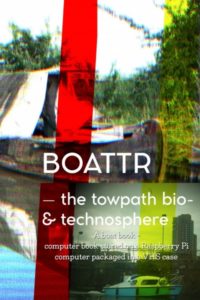
boattr.uk the towpath bio- and technosphere
ISBN: 978-1-906496-09-8, 2019, published by University of Malta & Mute Press
This boat book documents our journey on our narrowboat ‘Quintessence’ and the development of the boattr prototype in collaboration with MAZI (for “together” in Greek), a Horizon 2020 research project. Boattr connects narrow boats to the ‘Internet-of-Things’ and allows for open wireless mesh-networking within the narrow boat community, by using affordable microcomputers. The main goal of this project is to provide technology and knowledge that aims to 1) empower those narrow boats who are in physical proximity, to shape their hybrid urban space, together, according to the specificities of the respective local environment, and 2) foster participation, conviviality, and location-based collective awareness of the canals.
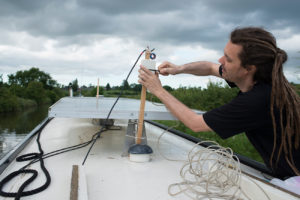
This is an edited collection of assembled and annotated boat logs, photographs and video essays, manifested, in a scholarly gesture, as a ‘computer book’.
The boattr prototype was built on the MAZI toolkit and the capabilities offered by Do-It-Yourself networking infrastructures – low-cost off-the-shelf hardware and wireless technologies – that allow small communities or individuals to deploy local communication networks that are fully owned by local actors, including all generated data. These DIY networks could cover from a small square (e.g., using a Raspberry Pi) to a city neighbourhood (e.g., the Commotion Construction Kit used at the RedHook WiFi initiative) or even a whole city (e.g., guifi.net, awmn.net, freifunk.net), and in the case of boattr the UK canal network.
The boattr DIY infrastructures offer a unique rich set of special characteristics and affordances for offering local services to the narrow boat community, outside the public Internet: the ownership and control of the whole design process that promotes independence and grass-roots innovation rather than loss of control and fear of data shadows; the de facto physical proximity of those connected without the need for disclosing private location information, such as GPS coordinates, to third parties; the easy and inclusive access through the use of a local captive portal launched automatically when one joins the network; the option for anonymous interactions; and the materiality of the network itself. The prototype integrates existing FLOSS software, from very simple applications to sophisticated distributed solutions (like those under development by the P2Pvalue project, mobile sensing devices, and recent developments in open data and open hardware), allowing it to be appropriated by different non-expert users according to their respective context and use case.
buy from Mute Press
Price – Pre-assembled: 250€. Plus postage
A video book – paperback book and video stored on a Raspberry Pi computer packaged in a VHS case
Also available as online video and book PDF download.
Video and PDF – ISBN: 978-1-906496-23-4, 2017, published by Open Humanities Press
Theorising a World of Video
after.video realizes the world through moving images and reassembles theory after video. Extending the formats of ‘theory’, it reflects a new situation in which world and video have grown together. This is an edited collection of assembled and annotated video essays living in two instantiations: an online version – located on the web at http://after.video/assemblages, and an offline version – stored on a server inside a VHS (Video Home System) case. This is both a digital and analog object: manifested, in a scholarly gesture, as a ‘video book’. We hope that different tribes — from DIY hackercamps and medialabs, to unsatisfied academic visionaries, avantgarde-mesh-videographers and independent media collectives, even iTV and home-cinema addicted sofasurfers — will cherish this contribution to an ever more fragmented, ever more colorful spectrum of video-culture, consumption and appropriation…
Price – Pre-assembled: GBP 122 Self-assembly, GBP 88. Plus postage
–
FLOSS TV – TV hacking within media arts practice in Routledge Companion to Alternative and Community Media
In this chapter FLOSS.TV (Free, Libre, Open Source Software TV) Hadzi focuses on media interventions in the realm of digital culture. Through new and emergent media technologies Hadzi considers media practices at a discrete level of analysis: from the local to the transnational. FLOSS.TV attends to the social, cultural, and political specificity of these discrete media practices, or in specific TV hacking interventions. While FLOSS.TV finds historical analogues in earlier artistic, activist and journalistic practice, these contemporary TV hacking practices highlight the limits and possibilities of media interventions in an era of networked communication. Drawing on contemporary theorizing on tactical media, radical democracy, and media spectacle this chapter helps to better understand the character and conduct of cultural politics in the 21st century. The FLOSS.TV research operates in the context of a European political discourse, where the main concern is counter-cultural approaches to non-mandatory collaboration and contractual agreements. FLOSS.TV covers a broad range of practices, from television via documentary up to media arts productions. This chapter documents the endeavour to formulate a policy for FLOSS culture. FLOSS.TV studies the impact of new IP legislation on media production, as well as conceptions and applications of collective authorship and alternative licensing schemes.
buy from Routledge
–
Deckspace.TV reSynced in Plants, Androids & Operators
This book documents the first life-cycle of the Post-Media Lab (2011-2014). Taking up Fèlix Guattari’s challenge, the Lab aimed to combine social and media practices into collective assemblages of enunciation in order to confront social monoformity. Here we draw together some key essays, images and art projects by the Lab’s participants, as well as a close documentation of its associated events, talks, and exhibitions, to create a vivid portrayal of post-media practice today.
With contributions by: Clemens Apprich, Josephine Berry Slater, Micha Cárdenas, Sean Dockray, Mina Emad, Bogdan Dragos & Inigo Wilkins, Fabien Giraud, Adnan Hadzi & James Stevens, Martin Howse & Jonathan Kemp, irational.org, Anthony Iles, Oliver Lerone Schultz, Gordan Savičić, Moritz Queisner, Rózsa Zita Farkas.
download Plants, Androids, & Operators
other Post Media Lab books
–
Edition Digital Culture 2: Hacking
Hacker brechen Systeme auf und ändern die Regeln. Das fasziniert die Kunst. Mit Beispielen von etoy, UBERMORGEN.COM und der !Mediengruppe Bitnik und Texten von Raffael Dörig, Hannes Gassert, Verena Kuni, Felix Stalder, und Claus Pias. Das Buch wird von Dominik Landwehr im Auftrag des Migros-Kulturprozent herausgegeben und erscheint anfangs Oktober 2014.
buy Hacking
–
Delivery for Mr. Assange
On 16 January 2013, !Mediengruppe Bitnik sent a parcel containing a camera and a GPS signal to Julian Assange, the founder of WikiLeaks, to find out what would happen on the way. Would it be possible to break through the physical barrier surrounding Assange, who is living at the Ecuadorian Embassy in London to escape being extradited to the USA? Would the parcel’s journey end with a picture of Assange’s face or would it be intercepted and destroyed by an intelligence officer of the British Secret Service?
This is the account of an extraordinary delivery and the uproar that followed on the Internet.
buy Delivery for Mr. Assange
–
Deckspace.TV in Post-Media Lab portfolio 2012-2014
For the fellowship James Stevens and Adnan Hadzi will critically and creatively engage with the SPC archives and the mapping of SPC’s networked media environment, by analysing the socio-technological
relationships between subscribers, services, and machines.
SPC has a long history of facilitating interactive art, the utilisation of ‘found systems’, and archives around cultures of identity and representation within the media arts. Deckspace.TV will actively involve
community members of those digital cultures, reviewing their experiences and impressions.
download Post-Media lab portfolio
–
Critical Video Editing in Media Interventions
This collection of essays, the first book-length treatment of its kind, explicates the concept of «media interventions», which are herein defined as activities and projects that secure, exercise, challenge or acquire media power for tactical and strategic action.
Drawing on insights from media, communication and cultural studies, contributors offer penetrating analyses of media interventions in a variety of social, political, and cultural settings from culture jamming and DIY media to public relations campaigns and reality television shows. In doing so, the volume develops an analytical framework for examining the complex and contradictory operation of media power in contemporary society.
Providing a more nuanced and comprehensive understanding of the uneven, fluid, and heterogeneous operation of media power, this volume breaks new ground on the theory and practice of media interventions and also contributes to and stimulates the development of a productive line of inquiry into the study of media interventions.
buy from Peter Lang Publishers
–
TV LIKE US
is a publication on community, media and art in the city edited by Hanna Harris with Suvi Kukkonen, Olli-Matti Nykänen and Jenni Tuovinen. Part One revisits the TV Swansong project by artists Karen
Guthrie and Nina Pope.
Artists have often challenged the passive relationship viewers have with television by taking control of TV and the way it is both produced and consumed, questioning television’s cultural influence and authority.
download TV LIKE US
–
PhD thesis: FLOSSTV – Free, Libre, Open Source Software (FLOSS) within participatory ‘TV hacking’ Media and Arts Practices
–
Data Sphere in Sarai Reader 08: Fear
Modernity’s great promise – the freedom from fear, now lies in ruins. One can argue that this vision was always compromised – modernity (especially in the form that emerged in the West, under Capitalism) always hid its own fears, and hid from its own fears – the fear of epidemics, of urban panic, of the homeless multitude and of criminal activity. This led to a drive for transparency: for separating the civic from the criminal, the civilised and the barbaric peoples, the human from the non human, life from the machine. With the advent of the mass slaughters of the 20th century, where more died than ever in recorded human history, this promise lay shattered. Today, the drive for transparency has been rendered doubly difficult, with new mobile populations, new networks, new previously unimagined terrors. Sovereignty seems an antiquated slogan of the past, and in the wake of the financial shocks of 2008, there seems to be some substance in the contention that Western capitalism has entered a phase of possibly long term decline.
Today’s opacity brings with it a new sense of enduring fear. Not necessarily the terror of sharp and sudden shocks alone, but of the slow mutation of our lives and our times into mine-fields of uncertainty – personal, social and political – that we try and side-step blindfolded.
This gingerly navigation across surfaces that might slowly erode to suddenly give way under our feet marks almost every aspect of our lives. Our world has become a nervous system. We do not trust the weather, the air, the water we drink, the food we eat, the blood that courses through us. We even have misgivings about the experts who reassure us on prime-time television about the trustworthiness of the value of our money or the colour of our dreams. Everything, from the small talk that lubricates sociality to the small print that pads contracts, comes laden with disclaimers. We are always, everywhere, from bedrooms to classrooms to laboratories, offices, fields and the street, taking cover…
download Sarai Reader 08
–
Depford.TV Showcase in Vertigo
Deptford TV is a research project on collaborative film. It is an online media database documenting the urban change of Deptford, in South East London. Deptford TV functions as an open, collaborative platform that allows artists, filmmakers and people living and working around Deptford to store, share, re-edit and redistribute the documentation of Deptford.
access Vertigo Showcase
–
Strategies of Sharing in Street Signs
The CUCR produces a magazine ‘Street Signs‘. The magazine provides readers with updates on recent work and developments at the Centre but also includes original writing and reviews by both graduate students on our MA and PhD programmes and academic associates. You can also download previous copies of Street Signs.
We welcome contributions from associates, students and others interested in the work of CUCR. If you would like to contribute a photographic essay; a book review or an occasional piece (the more idiosyncratic the better – this is not meant to be a peer review refereed journal), then please e-mail either Caroline Knowles or Carole Keegan.
download Street Signs Autumn 2007
–
A2T in The Alternative Media Handbook
‘Alternative Media’ is the term used to describe non-mainstream media forms that are independently run and community focussed, such as zines, pirate radio, online discussion boards, community run and owned broadcasting companies, and activist publications such as Red Pepper and Corporate Watch. The book outlines the different types of ‘alternative media’ and offers an overview of global alternative media activity, before moving on to provide information about alternative media production and how to get involved in it, including:
- What is Alternative Media?
- alternative media in practice
- making media
- getting involved.
This book will primarily appeal to students studying media freedom, alternative media, media globalization and media production as well as anyone wishing to embark on a career in this field.
buy from Routledge
–

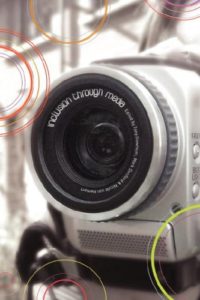
Initially with Deptford.TV, and later with Inclusion Through Media, we have collaboratively created a number of books, all having in common that they deal with new media. The two Deptford.TV diaries both act as a documentation of this Deptford-based community TV project, as an exploration of the urban change taking place in this area, and as a contemporary critique of the rigidity of media existing systems. The Converge manual is a hands-on guide to publishing your own film material on the net, and Inclusion Through Media is an ambitious reader adjoining the UK-wide project with the same name, where youths across Britain were engaged to make their own audiovisual media in different ways, facing different obstacles depending on their varying social backgrounds.
–
Deptford.TV diaries I – strategies of sharing

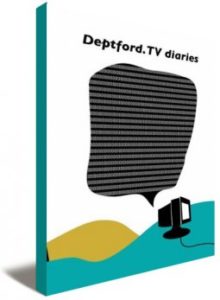
Deptford.TV diaries [autumn 2006] Deptford.TV is an audio-visual documentary project, tracing the regeneration process of Deptford (south-east London) in collaboration with SPC.org media lab, Bitnik.org, Boundless.coop, Liquid Culture and Goldsmiths College. Since September 2005 they have assembled audiovisual material around the area, asking community members, video artists, film-makers, visual artists and students to contribute statements, feedback and critique of the ongoing process of urban change in Deptford. The unedited as well as edited media content is being made available on the Deptford.TV database and distributed over the Boundless.coop wireless network. The media is licensed through open content licenses such as Creative Commons and the GNU general public license.
This book is a compilation of theoretical underpinnings, interviews and written documentation of the project.
download Deptford.TV diaries I content
download Deptford.TV diaries I cover
Published with OpenMute print on demand
–
Deptford.TV Diaries II – Pirate Strategies

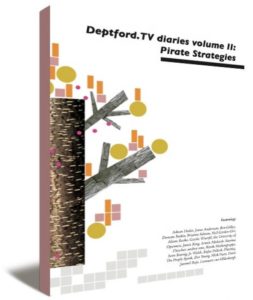
Deptford.TV diaries II: Pirate Strategies [spring 2008] Deptford.TV is an audio-visual documentation of the urban change of Deptford (south-east London) in collaboration with SPC.org media lab, Bitnik.org, Boundless.coop, Liquid Culture and Goldsmiths College.
The unedited as well as edited media content is being made available on the Deptford.TV database and distributed over the Boundless.coop wireless network. The media is licensed through open content licenses such as Creative Commons and the GNU general public license.
This book is a compilation of theoretical underpinnings, local narratives and written documentation not only of the local Deptford.TV project but of phenomena relating to an in many ways new situation of ’strategic’ rather than ‘tactical’ alternative media.
download Deptford.TV diaries II: Pirate Strategies
download Deptford.TV diaries II cover
Published with OpenMute print on demand
–
Converge

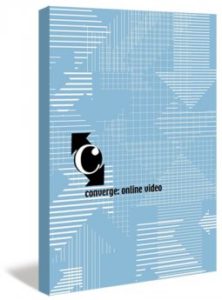
Converge [autumn 2007] A project within the ITM programme that enables young people to showcase and distribute their audiovisual works on the web. In collaboration with Hi8us, Goldsmiths College produced this handbook and workshop programme to enable young people to make use of existing sites like the Internet Archive, Participatory Culture, YouTube and Video Syndication Network and to publish videos on own sites using free an open source software.
download Converge Online Video
download Converge cover
Published with OpenMute print on demand
–
Inclusion Through Media

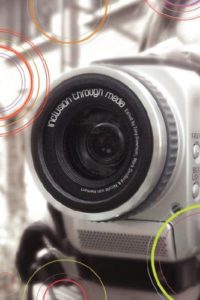
Inclusion Through Media [autumn 2007] ITM is a programme of projects across the UK which use audio-visual media to engage young people and excluded individuals and communities. It focuses on projects that bring the target groups together with media professionals to produce high-quality products for maximum impact. ITM projects stress innovative methods and participatory approaches. One of ITM’s objectives is using ICT for the production and distribution of learning materials and products developed by partners and target groups.
The book (edited by Tony Dowmunt, Mark Dunford and Nicole van Hemert) brought together critical insights and themes explored in the ITM programme. It offers first hand accounts of the work, together with critical analysis of the processes it involves and the policy issues it raises. It explores how working creatively with media can contribute to social cohesion, and points the way to new media, youth and social policy.
Published with OpenMute print on demand
–
NODE.London Reader II

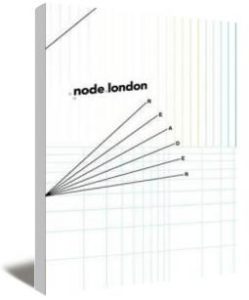
NODE.London Reader II [March 2009] The NODE.London Reader II projects a critical context around the Season of Media Arts in London, March 2008. NODE.London (Networked, Open, Distributed, Events. London) is a voluntary network of people, organisations and projects sharing and developing the infrastructure for media arts and related ctivities in London and beyond. This reader revisits debates on media arts and activism, collaborative practices and organization and the political economy of media economics. It includes contributions from Ruth Catlow, Marc Garrett, Anna Colin, Julie Freeman, Matthew Fuller, Usman Haque, Jamie King, Armin Medosch, Jonas Andersson, Toni Prug, Adnan Hadzi, Cinzia Cremona and Petra Bauer. Edited by Mia Jankowicz, Anna Colin, Adnan Hadzi and Jonas Andersson.
download Node.London reader
download Node.London cover
Published with OpenMute print on demand

